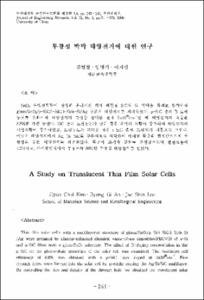Developmental changes in the use and perception of Japanese Mass Culture(video games) in Korean children and adolescents
- Alternative Title
- 일본 대중문화(비디오게임)에 대한 한국아동/청소년의 수용도와 지각발달
- Abstract
- 컴퓨터와 인터넷을 대표로 하는 미디어의 발달로 대중문화의 세계화가 가속되어 외국문화가 물밀 듯 밀려오고 있다. 특히 최근 공식적으로 개방된 일본문화의 유입은 또다른 전환점을 마련하였다. 일본대중문화는 이미 수십년전부터 국내에 유입되고 있었으나 한일간의 역사적인 관계로 인하여 공식적인 개방은 미뤄져 왔다. 따라서 일본 상품이나 문화는 한국인에게 양가적인 감정을 유발시킨다. 본 연구에서는 1,200명의 초등학생부터 대학생을 대상으로 일본 비디오게임, 만화영화/영화, 만화/잡지, 의류/엑서서리/문구, 그리고 대중음악등 5가지로 분류된 일본 대중문화상품에 대한 83개 문항의 설문지를 배부하여 1,107명의 자료를 최종 분석하였다. 이중 비디오게임의 이용과 지각만을 보고하는데 아동/청소년기 동안 일본 비디오게임의 사용은 연령이 증가함에 따라 증가하였다. 일본 비디오게임에 대한 이용이 증가할수록 그에 대한 정서적인 반응은 긍정적이었으며 인지적 지각도 더욱 증가하였다. 적어도 아동/청소년기 동안 연령이 증가함에 따라 일본 비디오게임 사용시 느끼는 죄책감은 감소하였으며 외국제품을 구분하는 능력은 증가하였다. 일본 제품에 대한 인지적, 정서적 지각에 있어 성차는 없었으며 부모의 교육과 수입정도에 따른 SES의 차이도 없었다. 끝으로 초등학생의 경우 부모에게도 같은 질문지로 조사한 내용과 비교했을 때 부모자녀의 정서적, 인지적 지각도간에 매우 낮은 ?箚桓맛? 나타났다. 따라서 일본 대중문화에 대한 젊은 세대의 지각은 부모세대와 분리되어 있으며 젊은 세대를 중심으로 한 올바른 대중문화교육이 필요함을 시사하였다.
The development of mass communications due to computer technology accelerated the globalization of Korean mass culture. Recent official opening of Japanese mass culture especially marked a turning point in Korean mass culture: Despite the fact that Japanese mass culture has been in Korea for decades, historical relations between Japan and Korea have prevented the open-door policy for Japanese culture. This study surveyed 1,107 students from elementary school to college on the use and perception (emotional and cognitive) of Japanese mass culture(video games, animations/movies, comic books/magazines, clothes/accessories/stationaries, pop music) among young generations in Korea with 83 items. Here only the data on video games were presented. It was found that the contact/use of Japanese product increased with age from elementary school to high school. With more contact with the Japanese products, users perceived Japanese products more favorably and had better ability to distinguish foreign products from Korean. With age, the guilty feeling decreased. The perception and cognitive appreciation of Japanese products did not change much with the gender of the subjects, regional differences, or SES including parents' education and the income level of household.
Analyses of correlation between parent's responses and their children's revealed that there were only a few weak correlations between them. It seems that young people have their own way of perceiving foreign products independent of their parents. Therefore, for better accommodation of Japanese mass culture in young Koreans, policies or education just for these generations need to be developed.
The development of mass communications due to computer technology accelerated the globalization of Korean mass culture. Recent official opening of Japanese mass culture especially marked a turning point in Korean mass culture: Despite the fact that Japanese mass culture has been in Korea for decades, historical relations between Japan and Korea have prevented the open-door policy for Japanese culture. This study surveyed 1,107 students from elementary school to college on the use and perception (emotional and cognitive) of Japanese mass culture(video games, animations/movies, comic books/magazines, clothes/accessories/stationaries, pop music) among young generations in Korea with 83 items. Here only the data on video games were presented. It was found that the contact/use of Japanese product increased with age from elementary school to high school. With more contact with the Japanese products, users perceived Japanese products more favorably and had better ability to distinguish foreign products from Korean. With age, the guilty feeling decreased. The perception and cognitive appreciation of Japanese products did not change much with the gender of the subjects, regional differences, or SES including parents' education and the income level of household.
Analyses of correlation between parent's responses and their children's revealed that there were only a few weak correlations between them. It seems that young people have their own way of perceiving foreign products independent of their parents. Therefore, for better accommodation of Japanese mass culture in young Koreans, policies or education just for these generations need to be developed.
- Issued Date
- 2001
- Type
- Research Laboratory
- Publisher
- 생활과학논문집
- Language
- eng
- Rights
- 울산대학교 저작물은 저작권에 의해 보호받습니다.
- Citation Volume
- 2
- Citation Number
- 2
- Citation Start Page
- 16
- Citation End Page
- 24
- Appears in Collections:
- Research Laboratory > Journal of human ecology
- 파일 목록
-
-
Download
 000002024941.pdf
기타 데이터 / 340.21 kB / Adobe PDF
000002024941.pdf
기타 데이터 / 340.21 kB / Adobe PDF
-
Items in Repository are protected by copyright, with all rights reserved, unless otherwise indicated.